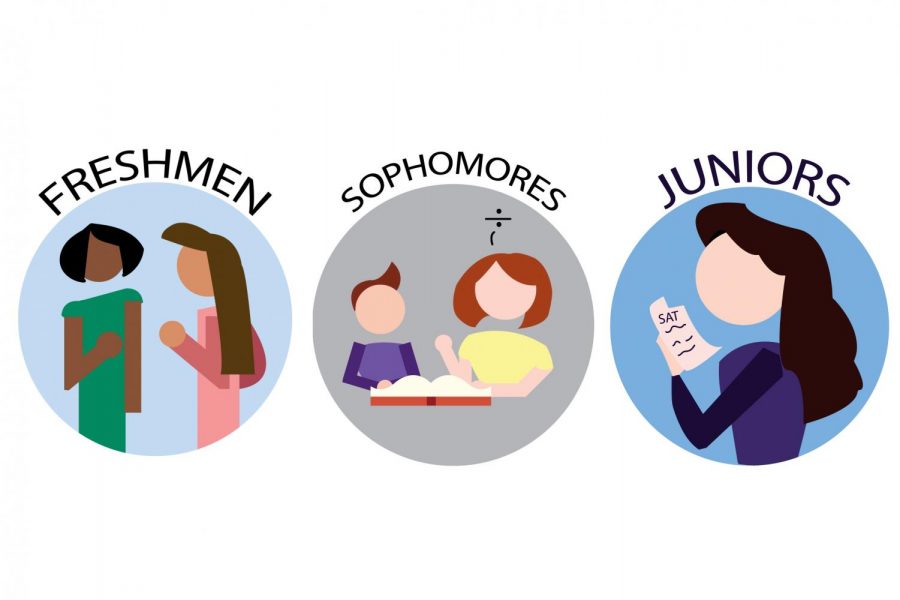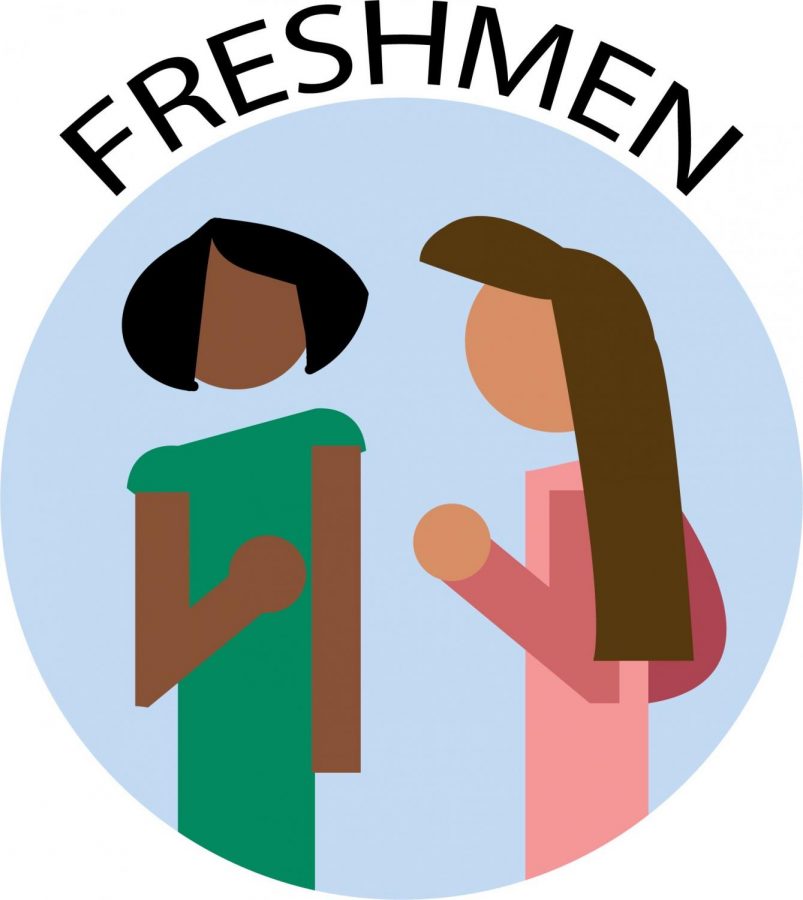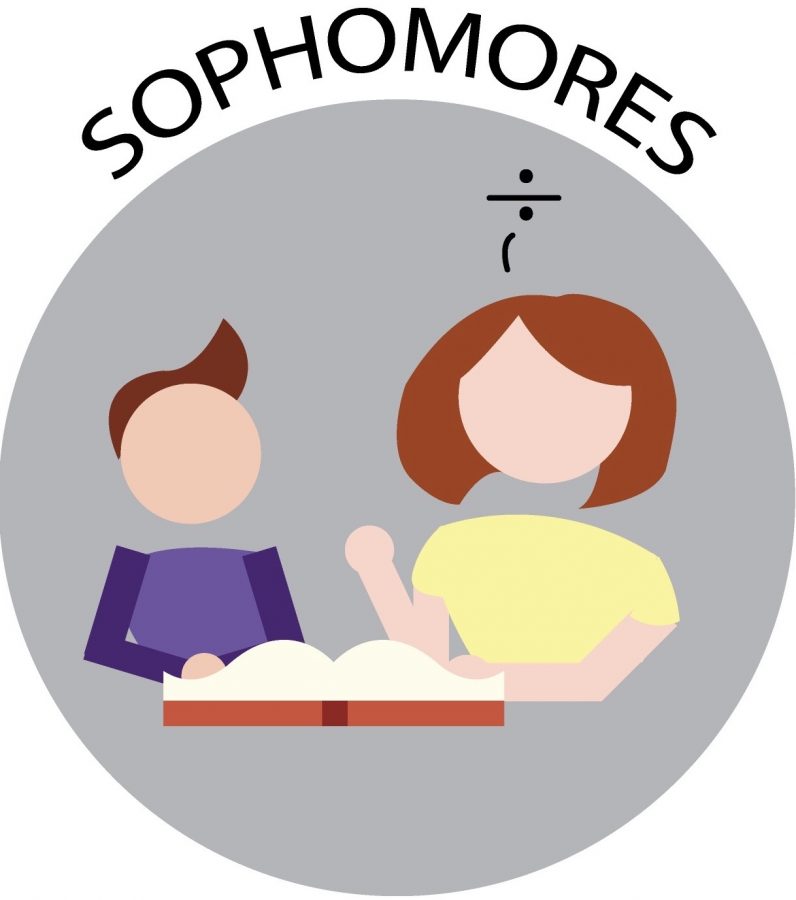Lorelei Deakin
Seniors offer advice to freshmen, sophomores and juniors at U-High.
High school advice: Seniors offer tips on freshman, sophomore, junior year
June 4, 2020
Whether you’re a rising freshman new to the community, or a junior getting ready for college, the upcoming years may feel insurmountable. Stress, high expectations and extra curriculars will build up and it’s important to find a balance between schoolwork and social time. Members from the Class of 2020 know how hard finding a balance can be, but they also know how to go about it. Having experienced many of the highs and lows of high school, they have successfully gotten through it and learned some valuable lessons about time management, friendship, leadership and college applications.
Freshman year: adjusting to a new environment
Finding your group
Freshman year offers new opportunities, classes and social situations, which is often a big adjustment coming from middle school.
“Looking back, I don’t know anyone who thought freshman year was the best year of high school,” senior Gershon Stein said. “It is an adjustment year, and you need to let yourself adjust to high school.”
One of the best ways to adjust to this new environment, according to Gershon, is by finding a close group of friends through clubs and extracurriculars. Gershon, who was new in his freshman year, joined the Ethics Bowl club to meet people.
“You’re going through a very difficult, rigorous curriculum and you don’t really have a lot of close friends to talk to because it takes time to develop friendships,” Gershon said. “Remember that you will make friends and you will have close relationships, it just might take a little bit of time.”
Senior Devyani Dharaniragada was new to the Lab community her freshman year and joined a lot of activities to make friends.
Comparison was something that Devyani struggled with, especially since U-High is a very competitive environment. According to Devyani, it is important to find those who will be there for you and to always stay true to yourself.
“I think joining a bunch of activities and just putting yourself out there is really important. Freshman retreat was also a place where I made a lot of friends,” Devyani said.

While clubs and extracurriculars are a great way to meet new people, Gershon emphasizes the importance of spending time with family and friends and not overbooking yourself.
“I take one day of the weekend where I don’t do any work, and then the rest of the weekend is work time,” Gershon said. “Friday night I’ll go out with my friends, and Sunday night I’ll go out with my grandmother, and then the rest of the weekend I spend working.”
During freshman year, students must also decide whether they prefer to take four or five majors.
“I think kids have to do what is right for them,” Gershon, who took five majors, said. “I think five majors are pretty manageable if you’re willing to put in a lot of work and long hours. I think it kind of also depends on what you want your work-life balance to look like.”
Gershon also highlights that teachers are sometimes flexible about workload as they understand that students are adjusting to high school.
“I wish I knew that you get through it,” Gershon said. “Freshman year takes a long time to adjust to, but once you adjust to it, you’re ready for the sophomore year.”
Sophomore year: Service Learning and finding your passion
More choices and striking a balance
Lorelei Deakin
One of the most prominent differences in 10th grade is the service learning requirement.
When most students think of freedom and choosing from a larger selection of classes and service learning, sophomore year is what comes to mind.
Unlike freshman year where students are required to take certain prerequisites, students in their sophomore year are given more freedom with the classes they choose. Senior Juliana Cui recommends having a well-balanced schedule that reflects students’ interests.
“It’s important to have a very well-rounded education before you go to college just so that you are prepared for anything that is thrown at you,” Juliana said. “Again, don’t pick something that is going to look good on a transcript or impress someone at an admissions office.”
Along with choosing classes, students must choose a service site to volunteer at for their sophomore year. Juliana recommends starting early and keeping an organized schedule. She also emphasizes keeping track of hours at the beginning of the year so students can ensure they finish on time. For incoming sophomores, she recommends looking at the list of service sites early on to get a sense of what options are available.
Along with service learning, sophomore year is a great time to take on different leadership roles within U-High. Senior Devyani Dharaniragada became a leader for the Social Justice Week committee and led a workshop for Social Justice Week. Along with this, she completed an internship through the Civic Engagement program over the summer.
“I’ve always been a little bit more on the shy side, so really stepping up to be a leader in the club taught me a lot about myself and what my role is within the community,” Devyani said. “It taught me a lot about collaboration and that line between being someone who’s approachable as well as someone who’s a leader.”

According to Juliana, it is common for students to feel stressed during their sophomore year, especially with the load of service and their accelerated classes. In order to fully enjoy sophomore year, Devyani reccomends a planner to help balance schoolwork and social time.
“Recognize that social stuff is also a priority aside from schoolwork. I think that was something I had to realize really late in my career,” Devyani said. “It’s really hard with all the schoolwork that Lab gives to really set aside time for yourself, but I think that’s super-duper important.”
While U-High is academically rigorous and known for having a lot of work, students should not overlook their mental health and make time for friends and family.
“I feel like sophomore year is the last year before you are completely stressed and loaded with stuff to do,” Juliana said, “so I also wish that I was a little less uptight and enjoyed it more before it ended.”
Junior year: College applications and standardized tests
Lorelei Deakin
While many 9th and 10th graders think about what college they want in the back of their minds, it’s not until 11th grade when college decisions begins to dominate students’ lives.
Junior year is a demanding time for many students. In addition to being the start of the college search process, many students have to prepare for standardized tests while simultaneously taking more rigorous classes.
According to Northwestern Medicine, having a routine can lead to improved mental health and help with sleep. Senior Ben Cifu recommends following a routine and making a schedule, especially for those who are worried about adapting to the new environment
“For the first few weeks of school, take a look at what you are planning on doing, see what you know and block out some dates on your calendar and start thinking about how you are going to lay out your year,” Ben said.
During junior year students are exposed to the college process. For many who don’t know where to begin, it can be overwhelming. Ben recommends to start by visiting different types of schools to have an idea of what you are interested in.
“After you have a sense of generally what type of school you like and generally what type of programs to look for, then you can start doing more research and focusing on what schools are out there that sort of fulfill these requirements,” Ben said.
For senior Franzi Wild, standardized testing was one of the most stressful parts of the college application process.
“I wish I had at the beginning of junior year taken the SAT once, because that would have really lowered my stress level later on in junior year when I was worrying about other parts of the college process,” Franzi said.
While Franzi and Ben think it’s important to have some ideas in mind about college, Franzi says there is no need to over-stress the college admissions process during junior year. She also emphasizes that there is still room for improvement from junior to senior year.
“I think I changed a lot between junior and senior year. In that period of growing and changing, I realized what I really wanted in terms of college. And I think one of the major things for me was just having that growth,” Franzi said. “Not knowing where I wanted to go to college for a lot of my junior year was totally fine for me.”
Franzi also recommends taking a rigorous course load and getting graduation requirements out of the way to lighten the course load for senior year while also balancing stress level.
“I wish I made even more time [for friends] than I did, because you don’t get that time back. Grades are important junior year, but grades aren’t everything, and high school is a lot more than just your GPA and where you end up for college,” Franzi said. “In the end, everybody goes to college, everybody ends up where they’re going to be happy. So it’s OK to slow down and smell the roses.”



